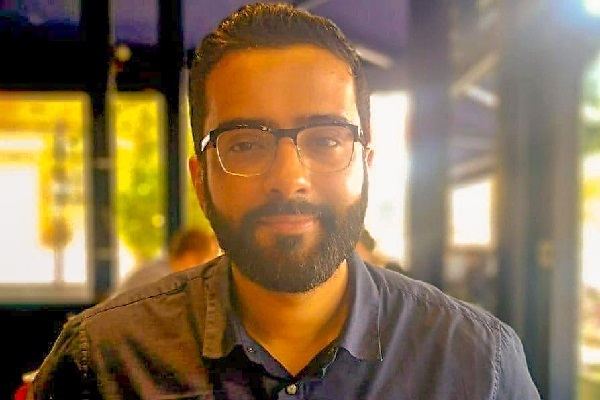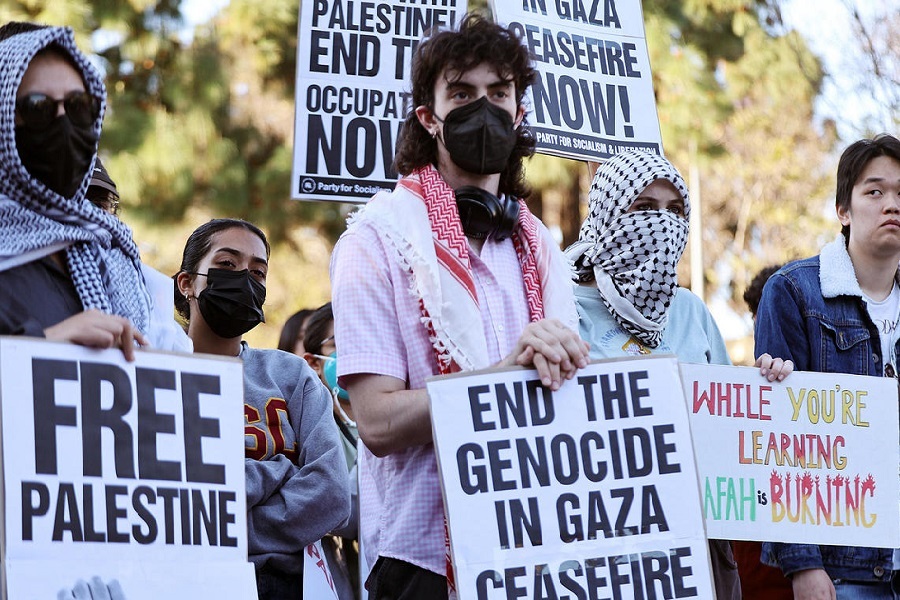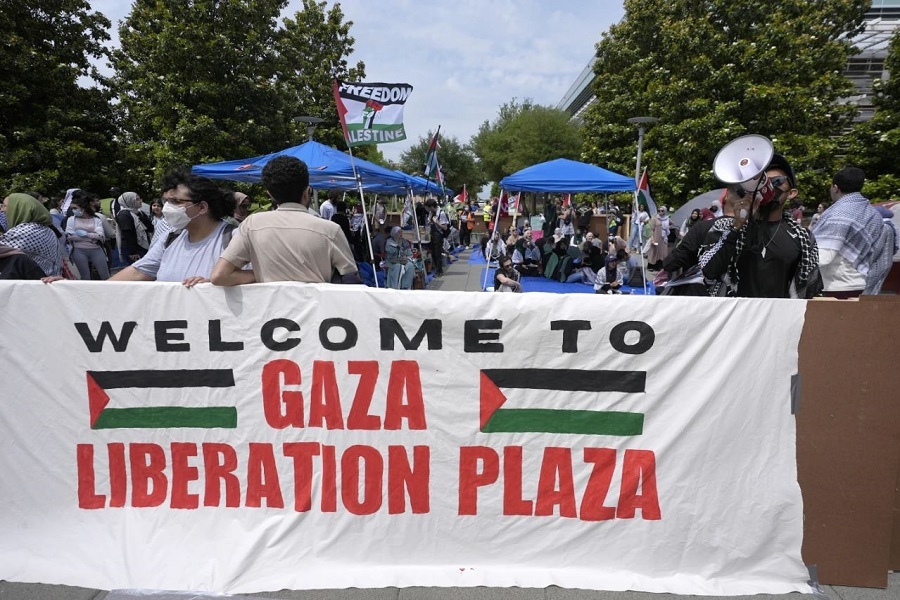Campus Protests ‘Puncturing Cloak of Silence’ over Palestine: UK Academic

Speaking to IQNA, Dr Fahid Qurashi, a Lecturer in Criminology at the University of Salford, Manchester, said that the campus protests are “are puncturing the cloak of silence and wilful ignorance that has been placed over Gaza and Palestine in mainstream debate and discussion so that no-one can say they are not aware of what is happening to Palestinians every day.”
Demonstrations expressing support for Gaza have emerged at universities across the United States starting in April. These student-led protests are advocating for a range of actions from their universities, including an official endorsement of a ceasefire in Gaza, the cessation of financial investments in Israeli businesses and military suppliers, and the severance of academic relationships with Israeli educational institutions.
The movement has gained international traction, prompting parallel protests in the United Kingdom, various European countries, India, and Lebanon.
Beginning on April 18, following the arrest of 108 students at Columbia University, numerous educational institutions have enlisted law enforcement to dismantle the protest camps. This has led to over 2,600 arrests on upwards of 50 university campuses nationwide, as per the latest figures reported by the Associated Press.
The protests come as the Israeli regime's attacks on the besieged Gaza Strip since October has killed nearly 35,000 Palestinians, most of them women and children. The aggression has displaced almost all of the 2.3 million population of Gaza.
What follows is the full text of IQNA’a conversation wit Dr Qurashi:
IQNA: How do you evaluate the significance of campus protests in the US and elsewhere in raising awareness about the Palestinian issue and the occupation?
Qurashi: The global protests on university campuses against the genocide in Palestine have played a very significant role in raising awareness of Palestine and the genocide that is taking place in Gaza, where over 30,000 people have been killed (half of whom are children) and a man-made famine is becoming more of a reality every day. They have generated media interest around the world and inspired students across the world to raise their voices and protest at the genocide in Gaza. In particular, they are doing two things: 1) signalling to their institutions that the genocide will not continue in silence or without accountability; 2) creating pressure on institutions to support the Boycott, Divestment, and Sanctions campaign against Israel by examining their own relationships (financial, or otherwise) that could be making them complicit.
Already the student protests are showing signs of success. After students at Trinity College Dublin began an encampment on campus in support of Palestine, the university leadership responded, after only 5 days, by agreeing to divest from Israeli companies because of the loss of income caused by the protests: “Trinity will complete a divestment from investments in Israeli companies that have activities in the Occupied Palestinian Territory and appear on the UN blacklist,” it said. “Trinity will endeavour to divest from investments in other Israeli companies.” This is a major victory for students at Trinity College Dublin and it shows what can be achieved elsewhere.

IQNA: How effective can these protests be in putting international pressure on Israel to end the war on Gaza?
Qurashi: Whether the protests are successful in ending the genocide in Gaza cannot be determined because there is a lot of political will to support Israel amongst its powerful allies. During previous assaults on Gaza in 2008 and 2014, the US and the European Union exerted pressure on Israel after a few months to end their attacks, but that restraint is absent this time.
However, I think the protests can be, and have been successful, in a number of areas. Firstly, they are keeping the genocide of Gaza in the headlines and inspiring others. Secondly, as with the case of Trinity College Dublin, they are making concrete demands on institutions to condemn Israel and to divest from Israel, with some success. Thirdly, and perhaps most importantly, they are puncturing the cloak of silence and wilful ignorance that has been placed over Gaza and Palestine in mainstream debate and discussion so that no-one can say they are not aware of what is happening to Palestinians every day.
Read More:
These protests are a refusal to be silent whilst a genocide is taking place. They are a rejection of the consensus that we should be quiet and not speak about Palestine because it is a ‘controversial’ subject or because we ‘don’t know enough’, that we should trust Israel to behave itself, and that we should let it do its job. And most powerfully, they are an embodiment of the powerful WW2 slogan which emerged after the Nazi Holocaust, ‘Never again!’
IQNA: Some experts say that the protests show that the new generation is more aware of the situation in Palestine and this, in the long run, can help Palestinians. What is your take on this?
Qurashi: Palestine occupies an important place in the lives of people around the world. For many it is a touchstone issue that was key to their political awakening and activism precisely because it is happening before the eyes of the world in an era of anti-racism, human rights, freedom, and democracy. So, awareness of the Palestinian cause for liberation and self-determination has been well established.
That being said, in any political struggle there are key moments for every generation that galvanise a movement and remind them of its importance. The ongoing genocide in Gaza is one such issue for the current generation of students.
Read More:
In previous years, as outlined in Professor Norman Finkelstein’s book, This Time We Went Too Far: truth and consequences of the Gaza Invasion, the 2008 Israeli assault on Gaza, which lasted 22 days and resulted in 1,400 Palestinians being killed, was a seminal moment for many people who were previously either neutral or supportive of Israel.
After that assault, and then again after the 2014 Israeli assault on Gaza during which more than 2,300 Palestinians were killed, more and more people began to distance themselves from Israel and/or warmed to the Palestinian cause.
In each case, Israel’s position became more isolated on the world stage and that is also true now, especially since the International Court of Justice has ruled that there is a plausible case of genocide occurring in Gaza.
IQNA: Some universities in the US allowed the police into the campus to disperse the protesters and as a result, hundreds of students and even faculty members have been arrested, sometimes violently, by the police. This has raised debates about freedom of expression and the hypocrisy of Western authorities. What is your take on this?
Qurashi: Concerns about freedom of expression and speech and the hypocrisy of western institutions in refusing to allow pro-Palestine groups to peacefully protest the genocide in Gaza have been at the centre of the debates about the protests. However, they also raise another important issue. They illustrate quite clearly the close connections between higher education and state power, as manifested in heavily armed police forces, and the use of heavy disproportionate force against students and faculty peacefully protesting, with the implicit support of universities.
It exposes the embeddedness of higher education institutions in the racist political climate. It undermines the notion that campuses are spaces of academic freedom, freedom of speech, and of positive social change.
The moment higher education institutions begin to attract negative attention from political and media institutions and are told to shut down the protests, for the most part, they don’t hesitate. Rather than protecting the higher ideals for which they are venerated, they side with the establishment and invite harm against their students and faculty.
In doing this, they are also attempting to protect their reputations from criticism levelled at them by protestors for their complicity in genocide, so that their ability to make money, by recruiting future students and attracting funding from research councils and donors in a highly competitive market, is not diminished.

IQNA: What role do you believe faculty should play in student-led protests?
Qurashi: Faculty have an important role to play in the student-led protests against the ongoing genocide in Gaza. One the one hand they can offer leadership and research informed analysis of the genocide, of settler colonialism, and of the complicity of higher education institutions, as a way to make sense of the current climate and the direction and politics of the protests.
On the other hand, faculty also have a role to play in protecting students from harm levelled at them by their institutions by leveraging their positions with management to advocate for the rights of students to protest on campus and for the campus space to be a place that seeks to reach towards the higher ideals with which they are associated: the search for truth, justice, peace, and positive social change.
IQNA: How do you see these protests evolving, and what outcomes do you anticipate?
Qurashi: Israel’s allies on the world stage, chief amongst them the United States and Britain, are moving to curtail and stop the protests. In the UK, the Prime Minister met with university leaders this week to discuss ways to stop the protests from growing to other university campuses.
Framed around accusations of growing antisemitism, and tolerance on campus, discussions at the meeting included the disciplinary actions universities should take against students found guilty of antisemitism and the glorification of terrorism (which is a notoriously nebulous category).
The government agreed to fund the University Jewish Chaplaincy with £500,000 to monitor antisemitism and advise on guidelines to tackle it in higher education. Antisemitism on campus is understood through the widely criticised advisory International Holocaust Remembrance Alliance (IHRA) definition which conflates antisemitism with criticism of Israel.
Read More:
In light of the current student protests, the US House of Representatives passed a bill to expand the definition of antisemitism guided by the until now non-binding advisory IHRA definition. One of the problems in framing the protests as antisemitic is that they include, and are led by, large numbers of Jewish students and faculty who are critical of Israel.
The significance of the protests on university campuses rests on the fact that they are large and made up of a diverse range of students from numerous backgrounds which demonstrates the wide-ranging support that exists for the Palestinian cause and the diverse spaces from which criticism of Israel is emanating.
Accusing the protestors of antisemitism is thus disingenuous, but an important means to condemn and shut down the protests precisely because they are pointing to the isolation of Israel and its allies on the world stage.
As for the students and faculty protesting the ongoing genocide in Gaza, they are situated within the long and glorious tradition of student protests, condemned as extremist in their own time, against apartheid in South Africa, the civil rights movement and the Vietnam War in the US, and the invasion of Iraq in the ‘war on terror’. In protesting against a genocide in 2024, history will judge them in the same way we view student protests today of years gone by. They are on the right side of history.
The views and opinions expressed in this interview are solely those of the interviewee and do not necessarily reflect the view of International Quran News Agency.
Dr. Qurashi, an academic at the University of Salford since 2021, previously served as a Senior Lecturer in Criminology and Sociology at Staffordshire and Canterbury Christ Church universities. An esteemed Fellow of the HEA and member of the Teaching and Learning Academy, he leads the Criminology/Sociology Peer Mentor Scheme. With a PhD in Sociology from Kent, Dr. Qurashi's research spans Political Islam, Islamophobia, Counterterrorism, and more. He is also on the editorial board of the International Journal of Criminology and Sociology and is a Research Director at the Ayaan Institute.
Interview by Mohammad Ali Haqshenas



